AUGUSTA — Since 2013 nearly 500 rental units, more than one-tenth the city’s rental housing stock, have been destroyed or could be lost to fire damage or safety code violations, a trend described as “staggering” by the city’s housing authority.
City records show a total of 491 rental units have been lost or are at risk of being lost because of fires or safety code violations. Those include 68 rental units permanently lost in fires, 72 units closed because of safety code violations so severe officials deemed them unfit for occupation, and 351 units identified as having serious safety code violations requiring building owners to file corrective action plans explaining how and when the violations will be fixed.
If the owners of those 351 units don’t file correction plans and take action to fix the problems identified, those buildings could be forced to be vacated of tenants, too.
The data is cited in an Augusta Housing Authority grant application seeking federal funds to help address what officials describe as a crisis for Maine’s capital city.
“It’s worse than people realize,” Amanda Bartlett, executive director of the Augusta Housing Authority, said of unsafe housing conditions in Augusta.
She said there is such a shortage of safe housing in Augusta that many of the people eligible for federal housing assistance via Section 8 vouchers haven’t been able to use them.
“A third of the people we issued (Section 8) housing vouchers to last year couldn’t find housing in Augusta,” Bartlett said. “Part of that is the lack of housing stock. We’ve lost a lot of units to fire and closures due to code issues. And part of that is our housing is old and it is challenging to find rental housing that meets our standards.”
There are 962 multi-family dwellings in Augusta, according to city assessing records, with a total of 4,471 rental units in them.
Among the hazards found within some of those apartment buildings during inspections over the last two years are these: Windows too small for tenants to escape a fire or for firefighters to climb through to rescue someone inside, or worse still, no secondary means of exit at all. There are also rotted decks and support beams, missing or inadequate fire escapes, ceilings falling down, leaky roofs, units with no working smoke or carbon monoxide detectors, inadequate heat, piles of trash and no running water.
Those problems are among the conditions that have gotten some 20 apartment buildings shut down by the city because of safety code violations since 2013.
But officials say there are likely many more apartments with similar, but undiscovered and unreported conditions lurking in the city’s rental housing stock.
“I hope we’ve identified the most dangerous situations out there, but undoubtedly there is a building out there right now that exists in a similar condition to others we’ve closed, and we simply haven’t been in it,” said Robert Overton, one of two city code enforcement officers who has taken the lead in housing inspections since he started on the job in 2010.
In a successful application for $500,000 in federal Community Development Block Grant funds to help landlords make renovations to their buildings to help bring them up to code, Bartlett wrote, “Since 2013 Augusta has experienced the worst epidemic of residential structure fires and loss of rental units on record. With staggering property losses, we find ourselves in a unique position in the state as a capital city thrown into crisis and paralyzed by a lack of funding to address the immediate needs of safe, affordable housing. The situation has grown so dire that stabilization will not be possible without federal or state assistance.”
A Freedom of Access Act request filed by the Kennebec Journal seeking all correspondence regarding buildings shut down by the city — or shut down by the owners themselves after being informed of code violations since the start of 2013 — found 20 apartment buildings were shuttered because of major code violations.
The most common violations cited included electrical system problems such as junction boxes and outlets left uncovered or in disrepair; not enough or too small ways to enter or escape apartments; tenant’s items being stored in basements near heating equipment and lacking sprinklers or adequate fire-rated building materials separating them; a lack of adequate fire escapes; ceiling heights too low in apartments and stairways; plumbing or electrical work appearing to have been done by persons without the proper licenses, and stairs and railings lower than codes allow.
One of the most frequently cited safety problems would appear to be one of the most easily solved — a lack of adequate, working smoke detectors. With smoke detectors available for less than $10 each, putting them in is perhaps the cheapest and easiest of code violation fixes.
“The one thing that is most important is smoke detectors. It is so important for people to have working smoke detectors in their apartment,” Overton said. “It seems very simple, but we often go into a building and find them missing. We’ll inspect a building, let the owner know they’re missing detectors, and the next day while inspecting another building owned by the same landlord, find the same problem. It’s frustrating.”
Landlords note they can put in smoke detectors, but tenants might either remove them or take the batteries out.
“It happens very often. You walk into an apartment you just rented out a few days ago, the smoke detector was inspected so you know it worked (when the unit was rented out) and it’s gone, or it’s dangling from a wire and the battery has been pulled out,” said Larry Fleury, one of the city’s biggest landlords as owner of RCR, or River City Realty, which owns 26 rental buildings in Augusta with about 175 units.
“That’s why all of our units have hard-wired detectors. (When a tenant removes or disconnects a detector) I look them in the face and ask them, ‘Do you have kids here? Do you want them dying in a fire?'”
Codes generally require each apartment to have a hard-wired smoke detector outside every sleeping area, at least a battery-operated detector within each sleeping area and at least one detector on every story.
Mark Stevens, a supervisor with the state fire marshal’s office, explained these code requirements to about 25 local landlords and property managers who gathered at Augusta City Center for a fire safety forum in January organized by the Augusta Housing Authority. Stevens recommended against installing them in kitchens, because alarms there can be set off frequently by burned food, and frequent alarms can lead to “detector fatigue” in which people hear an alarm going off so many times, they may become more likely to ignore it.
At that same forum, Augusta Fire Chief Roger Audette noted safety codes aren’t just bureaucrats being picky. Nearly every code, he said, resulted from tragic fires and deaths in the past that raised awareness of hazards and prompted officials to take action and put code requirements in place.
“The fire code is critical,” Audette said. “Most fire codes are in place due to horrible events. Death dictates what we do.”
EXPENSIVE FIX
Fleury said as a landlord, it doesn’t pay to fight against code enforcement. He said all his buildings are old and thus require money to be put back into them to keep them safe.
Fleury had one building with 12 units among the 20 buildings shut down by the city for serious code violations in the last two years. Now an 11-unit multi-level building, the structure was built sometime before 1900 on a hill at 9 Laurel St.
The building, deemed unsafe and ordered closed by Overton Aug. 23, 2013, is one of only a few closed down by the city that have been renovated and opened back up to tenants.
Fleury’s 9 Laurel St. reopened a year after it was ordered vacated after renovations including the replacement of fire escapes that served each unit but didn’t meet code, railings, decks and other renovations. Seven of the 11 units are rented out, none to tenants who lived there previously. By eliminating one unit, going from 12 to 11, the building became subject to a lower level of code requirements than would have been required had it remained a 12-unit.
Fleury said between construction costs and rent lost during the year, it cost him about $150,000. Other than a small portion of the construction costs to repair vandalism which occurred to the building during the closure, which was covered by insurance, the cost of the project came out of Fleury’s pocket. He noted that because the building was closed anyway, he also painted and made other, non-code-related improvements while the work was taking place.
“The whole project was engineered professionally; it was expensive,” he said. “We did get caught with our pants down on that one. But I feel good about the project now and about being part of getting things up to speed. We did it all over town. We jumped ahead of it.”
But the building closures can come with little notice to tenants.
In the case of 9 Laurel St., nine tenants had to find new places to live with just a few hours notice. Tenant William Thorp, an Army veteran, said he was told the morning of Aug. 23 the building had been deemed unsafe by the city and they had to be out by 3 p.m. that afternoon. He said the short notice was stressful and unfair. Friend, whom he planned to stay wit, helped him load his belongings onto a trailer.
Overton said the city has gotten complaints from tenants about receiving short notice they had to vacate an apartment, but said sometimes it is not possible to give much advance notice. When code violations are severe enough to make a building unsafe to live in, Overton said he cannot allow tenants to remain there in jeopardy.
“If we make a decision the building is unsafe for occupancy, it’s right then,” Overton said. “Enforcing the life safety code is not the most pleasurable thing. You know you’re causing a lot of financial problems for building owners and inconvenience for tenants. But I’ll take the criticism of causing inconvenience or a financial impact over not taking action and having someone get hurt.”
Overton noted city staff, even after a building has been deemed unsafe for occupancy, don’t have the automatic legal authority to force tenants to leave the building. When a building is deemed unfit for occupancy, city staff inform tenants the building is unsafe and tell them to gather their belongings and leave the building immediately because it is unsafe to stay. They are told if they refuse to leave, the city will pursue court orders to require them to leave. Overton said the city has never had to take that step — all tenants have left voluntarily without the need for a court order.
Overton said the city has not made anyone homeless by closing a building. He said if the landlord doesn’t have another place where they can go, the city puts tenants up in hotels until they find a place.
The Augusta Housing Authority also inspects buildings where tenants receiving Section 8 federal housing assistance vouchers reside to make sure those buildings meet federal housing standards, which are a different set of standards than the local safety codes. Bartlett said the federal housing standards go beyond safety codes in an effort to make sure the housing is of a certain quality, such as not having holes in walls. However, there is some overlap in federal housing standards and local safety codes, as both generally seek to make sure tenants have safe housing.
Other than the 9 Laurel St. building, only one other building closed down by the city since 2013 — 6 York St., and one floor of another building at 3 Washington Street Place — have been fixed up and reopened since being shut down.
Two closed buildings, 44 State St. and 32 Court St., have since been torn down.
The other 12 remain standing and vacant.
Several of the vacant buildings have been foreclosed upon by financial institutions, while many have also been vandalized. Neighbors to some of them have complained they have become eyesores attractive only to squatters and thieves.
Three of the properties, at 44 State St., 9 Patterson St. and 110 Northern Ave., were foreclosed upon by the city for nonpayment of taxes.
TENANTS IN MIDDLE
Jim Pinkham really liked his apartment at 36 Water St. at the corner of Water and Bond streets. But last year he had to move out of the apartment he had lived in for 10 years because the building failed an inspection by Augusta Housing Authority. He said the building failed not because of safety issues in his apartment, but because of structural issues with a deck and set of stairs on the building.
He said moving was a hassle and it was difficult to find another place to live. Pinkham said he doesn’t like his current apartment at 9 Waldo St. as much as his old, more modern apartment, but the building has passed an inspection by the housing authority.
He moved into the Waldo Street apartment two days before Christmas.
“It was hard to find a place. There is a housing shortage, so many places have been closed,” said the 55-year-old Pinkham, who receives federal housing assistance because he is disabled. “I didn’t want to go, it was a great apartment, but they told me I had to move if I was going to keep my Section 8 voucher.”
Statistics, too, indicate it has gotten harder to find an apartment in Augusta.
A 2014 market study by Hallowell-based Planning Decisions for the Augusta Housing Authority showed how vacancy rates have declined with the number of available units from a vacancy rate of 9.6 percent in 2000 to just 1.9 percent in 2014.
The 491 rental units lost to fire, closed due to code violations or with serious code violations putting them at risk of being lost represent 11 percent of the rental units in the city.
Pinkham said his former landlord at the Water Street building, Kane Coffin, who has since sold the building, was a good guy and treated him well, allowing him to stay in his old apartment while he looked for another even after Augusta Housing Authority stopped paying the lion’s share of his rent, but the building did seem to need some work.
Pinkham said he understands the need for the city and housing authority to conduct inspections to make sure apartment buildings are safe. However, he said, it’s not right for the city to only give some tenants 24 hours notice or less to move out when a building is deemed unsafe.
“The tenant is caught in the middle,” Pinkham said. “To lose your home can be very upsetting to people.”
Overton and Bartlett noted most inspections don’t result in a building being shut down.
But nearly every inspection of a building, Overton said, finds at least a few problems that need to be corrected. He said the city inspects about 100 buildings a year, most of them at the request of tenants.
“It is very rare we walk through a building and find it 100 percent in compliance,” he said. “There is almost always something.”
Usually, the problems found don’t require immediate closure. For easily corrected but serious problems, such as a lack of smoke detectors or a carbon monoxide detector, Overton said he’ll advise building owners to fix those issues immediately. For bigger problems that are likely to take more time to fix, such as ceiling heights too low or stairways that are too narrow, he’ll send a letter to building owners requiring them to send a plan of corrective action back to the city, explaining what they will do to fix the problems and when they’ll be fixed.
VIOLATIONS FOUND
During a recent inspection at a four-unit South Chestnut Street apartment building, Overton and Deputy Fire Chief David Groder found multiple code violations. Overton said he’d notify the building owners and seek a plan of corrective action to fix the apparent violations, including electrical work they said appeared to have been done by someone who wasn’t a licensed electrician, electrical junction boxes and outlets without covers, a missing carbon monoxide detector and an inadequate number of smoke detectors in one unit. There was also an old boiler that appeared to be in poor condition, a dryer vented into part of the basement instead of the outdoors, and basement laundry room and storage areas with ceilings too low and other issues that should make the basement off-limits to tenants.
A tenant of the building, who asked not to be identified, said when they ran the oven and other appliances in their apartment at the same time sometimes the power would go out and sometimes water leaked through their ceiling.
Overton said the violations didn’t rise to the level of danger that would require the building to be vacated immediately. He noted overall the building looked good and was in good condition for an older property. He said it likely hadn’t been inspected in decades, if ever.
But if the owners couldn’t fix the problems identified, the building could eventually be ordered to be vacated.
Overton said he planned to require the building owners to have the electrical system inspected by a licensed electrician. He said it could be costly to have the electrical system sorted out.
“It looks like it has been upgraded fairly recently,” Groder said of the electrical circuit panel in the basement. “The question is by who?”
The South Chestnut Street building was previously owned by the late David Tschamler, of Manchester, who died in January, leaving the rental property to his heirs. His son, Mark Tschamler, of Portland, said the family would complete the necessary updates to bring the building into compliance with codes.
“We’re not going to buck the system. We certainly don’t want to risk anyone’s safety,” Mark Tschamler said. “I’m not surprised (the building didn’t meet all codes), no, but I think probably half the city is in that category. I certainly understand the goal here is to bring stuff up to code and make sure there aren’t any unsafe situations. We’re all reflecting on the Noyes Street fire in Portland.”
Six people were killed in the Nov. 1, 2014, Noyes Street fire in Portland. Authorities said the fire was caused by a discarded cigarette and the apartment building did not have working smoke detectors.
Overton said since that tragic fire, awareness of safety issues in rental housing has been higher. He said the tragedy prompted more landlords to call his office to inquire about codes and an increase in “courtesy inspections” of buildings in which he walks through the building and points out problems that need to be fixed.
Tschamler said his dad tried to keep his rental property in good shape but was “old school, and did most of the stuff himself. He was qualified to do it. But he was frugal with his money.”
He said while the family will be able to afford to make repairs to the building so it meets code, he worries other landlords won’t be able to do so when similar problems are identified at their buildings. He said that could result in some landlords closing their buildings, and there thus being fewer apartments available for rent in the city.
“There are going to be building owners in this city that are not in a position to do the updates,” Tschamler said. “That’s going to create problems down the road. That would certainly be a concern to me, as a citizen, how is this going to play out? A lot of owners aren’t going to have the capacity to do what’s necessary. What happens at that point? What happens to those tenants? If there isn’t some kind of safety net, Augusta is going to have some problems. You’re going to see an increase in homelessness, a need for more social services. That’s an unintentional result, but that’s the reality of it. This is really putting the squeeze on people in a time in the economy when it is very difficult.”
OLD STOCK
Much of the city’s rental housing stock is old. Bartlett, Fleury, Overton and others agree that not all landlords have the money it takes to keep their buildings safe and up to code.
City assessing records cited in Augusta Housing Authority’s application for federal housing funds show 35 percent of apartment buildings in the city were built prior to 1940 and 53 percent prior to 1960. Many are more than a century old.
“The recession was quite difficult and fuel prices going through the roof was astronomical, that’s why you see buildings boarded up all over town,” Fleury said. “We’ve lost a lot of units in this city. The economy, especially for those with low income units, is tough.”
Overton said at least four buildings were shuttered by the owners over the last two years following inspections by the city. He said the owners chose to close the buildings rather than make the renovations necessary to meet codes.
He and Bartlett said they can sympathize with landlords, some of whom bought their buildings when the real estate market was at a high point and now aren’t bringing in enough rental income to make major renovations to their buildings.
Bartlett said the vast majority of landlords are fine, and when a problem is identified, they fix it. But she said some landlords say they can’t afford to take on the cost of renovations.
“The rents in Augusta are low enough that when you’re a landlord, it can become very hard to take on any additional debt service to make renovations because rents in the area don’t support a huge investment in your property unfortunately,” Bartlett said. “Most landlords want to do the right thing, but some just can’t financially do it. Some bought their building at the height of the market, and now it may be worth next to nothing, so they can’t refinance. So they may walk away. And nobody wants that to happen.”
She hopes the $500,000 federal grant the authority has been awarded for its Great Neighborhoods program will help. She said the funds will be used to provide up to $25,000 in funds to help landlords make renovations to their buildings, primarily renovations needed to bring their buildings up to safety code. The grants will require landlords to also put their own money into their buildings to be eligible. She said the grant funds aren’t nearly enough to address all the problems with rental properties in Augusta, but will help.
“To whatever extent we can support landlords, we need to do that,” Bartlett said. “Only when everybody is working together can we improve rental housing safety.”
Many apartment buildings in Augusta are never inspected. Overton said most of the inspections by the city are done at the request of tenants who have concerns about buildings. And the housing authority only inspects buildings where it has clients on federal housing assistance.
Bartlett said many tenants are unlikely to complain about safety problems in their buildings for fear their landlord could retaliate — illegally —and kick them out of their apartment. She said tenants with troubled pasts, such as those who have served time in jail or had financial problems and bad credit, are even less likely to report problems in their buildings.
“There is this whole invisible population in Augusta, people facing barriers, people in poverty, people with mental illness or other disabilities,” she said. “It can be very difficult for them to report housing safety concerns because they are afraid of losing their housing. It’s a vulnerable population. Even in an apartment with safety concerns, it may be the best place they ever lived. It may be hard for some to realize they deserve something better. Everyone deserves a safe place to live.”
SAFE HOUSING
Nancy Schiff-Slater, an attorney who represents low-income clients for Pine Tree Legal Assistance, said the organization is frequently contacted by low-income tenants in unsafe apartments seeking help.
“It is unbelievable, what squalor some tenants live in,” she said, describing units infested with bed bugs, covered in black mold, rotting staircases, broken windows and with electrical systems in disarray. “There are some landlords who somehow seem to think it is OK to not maintain their buildings because, but for them, these people wouldn’t have a place to live. It’s not all. There are some good landlords. But some may threaten their tenants that if they go to the authorities, they’re going to be evicted. They’re intimidated and feel they may lose the roof over their head if they assert themselves.”
At-Large City Councilor Dale McCormick, former director of the Maine State Housing Authority, said Maine has some of the oldest housing stock in the nation. She praised the efforts of the Augusta Housing Authority to create new, safe, affordable housing, such as with the conversion of the former Hodgkins Middle School into housing for senior citizens, construction of which is currently underway.
Schiff-Slater, Bartlett and Overton said the apartments in Augusta would be safer if inspections were conducted periodically at all rental properties in the city.
“I think all apartment buildings should be inspected periodically. That would be a wonderful thing,” Schiff-Slater said. “That is likely to have a fair amount of resistance from landlords.”
Bartlett said mandatory inspections of apartment buildings would help make sure more tenants are protected.
Overton said inspecting all apartment buildings in the city periodically would likely require another at least part-time code enforcement officer to help do all those new inspections.
Augusta city councilors have as one of their goals for the year a subgoal to “explore the financial feasibility of establishing a multi-year process of inspecting all rental residential units in the city for health and safety code violations,” though councilors have not yet taken up that topic formally.
Fleury said having to have their buildings inspected would only serve to place further strain and pressure on landlords struggling to make ends meet now.
“I feel like there is enough pressure” on building owners already, Fleury said of mandatory inspections at all residential rental properties. “That’d be just one more nail in the coffin. We do the best we can.”
Fleury said the safety of rental housing in Augusta will improve as the economy improves and landlords have more money to put into their buildings.
“I just think we’ve been going through one of the deepest recessions we’ve seen in generations. That’s 90 percent of the problem. People don’t have the money to make reinvestments in their properties,” he said. “Things will step up in a year or two. People will be able to do better, especially with oil prices down.”
Bartlett said there is no one simple solution to improving the safety of rental housing in Augusta; it’s going to take a community effort.
“Everybody has a right to safe housing,” Bartlett said. “And landlords have an obligation to provide safe housing. We all need to work together as a community to make that happen.”
Keith Edwards — 621-5647
Twitter: @kedwardskj
Send questions/comments to the editors.


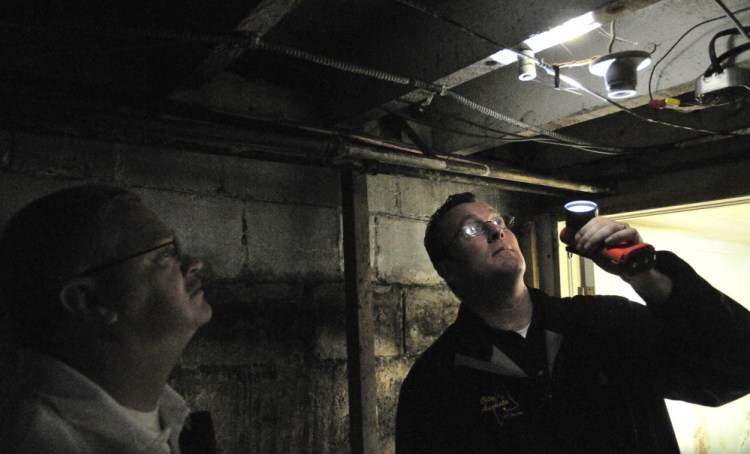
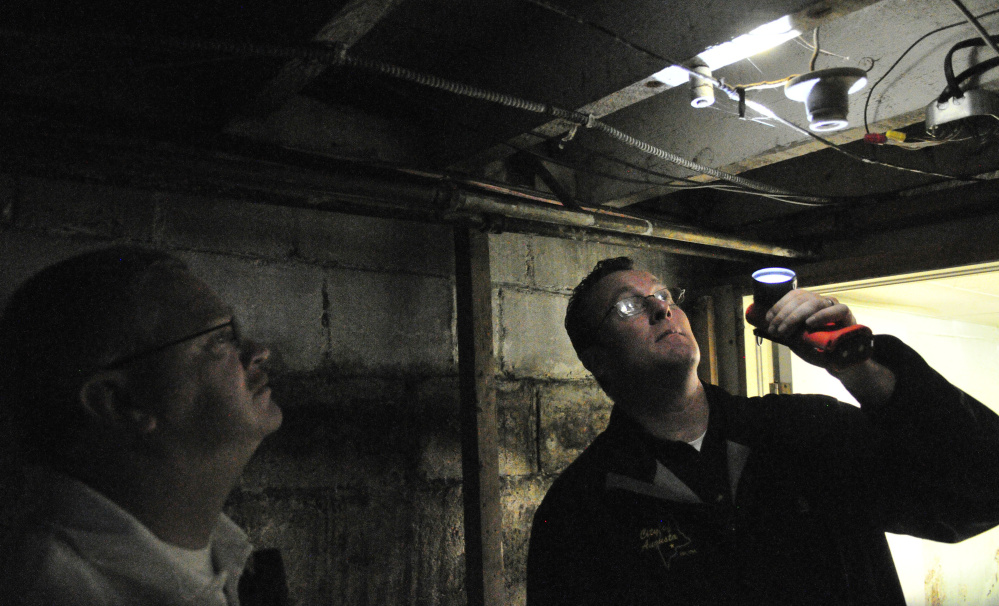
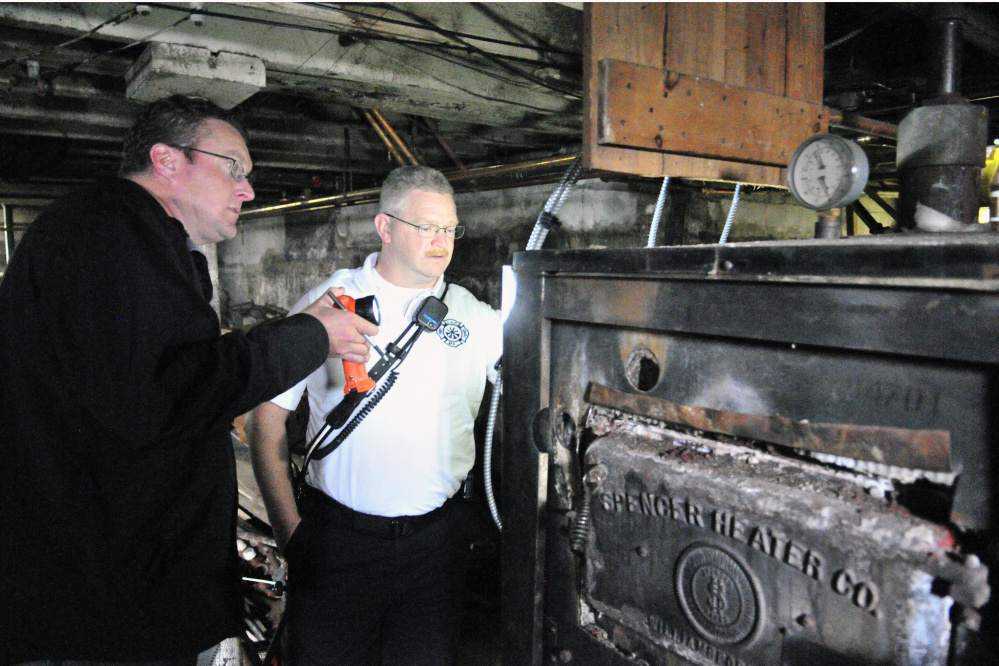
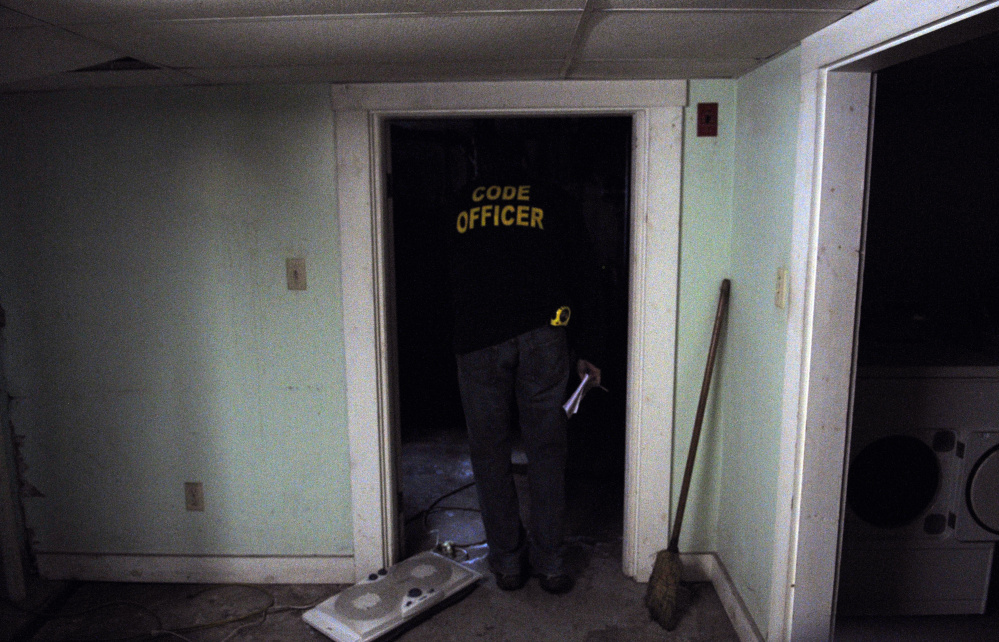
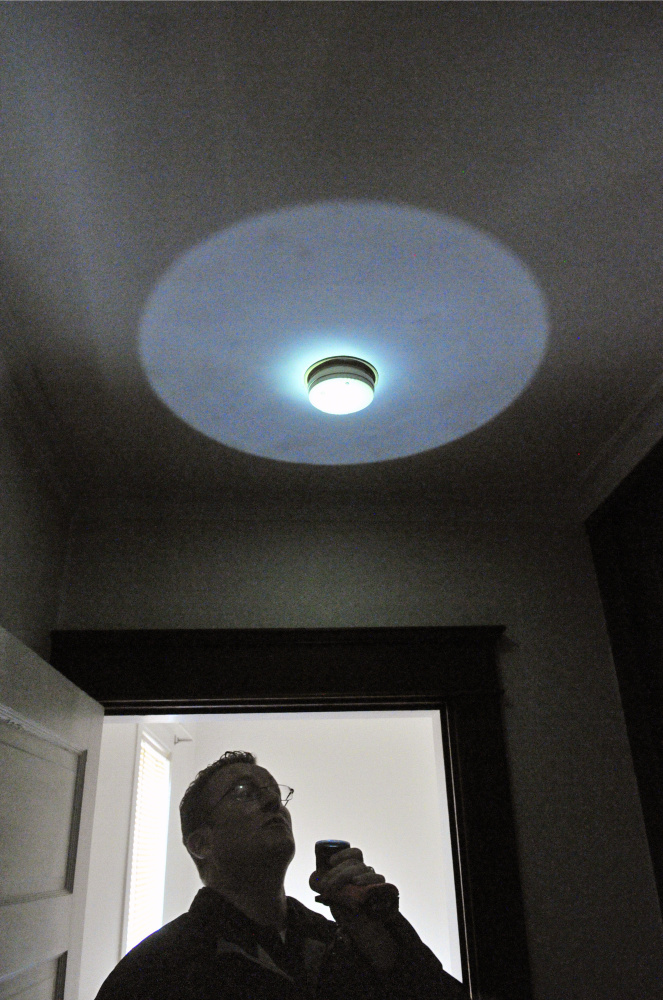
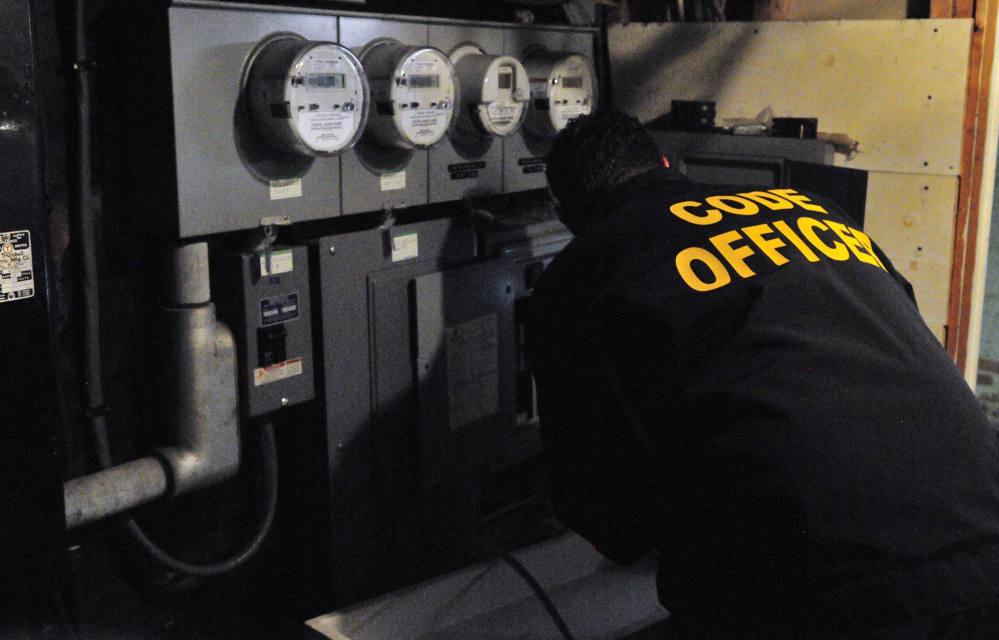
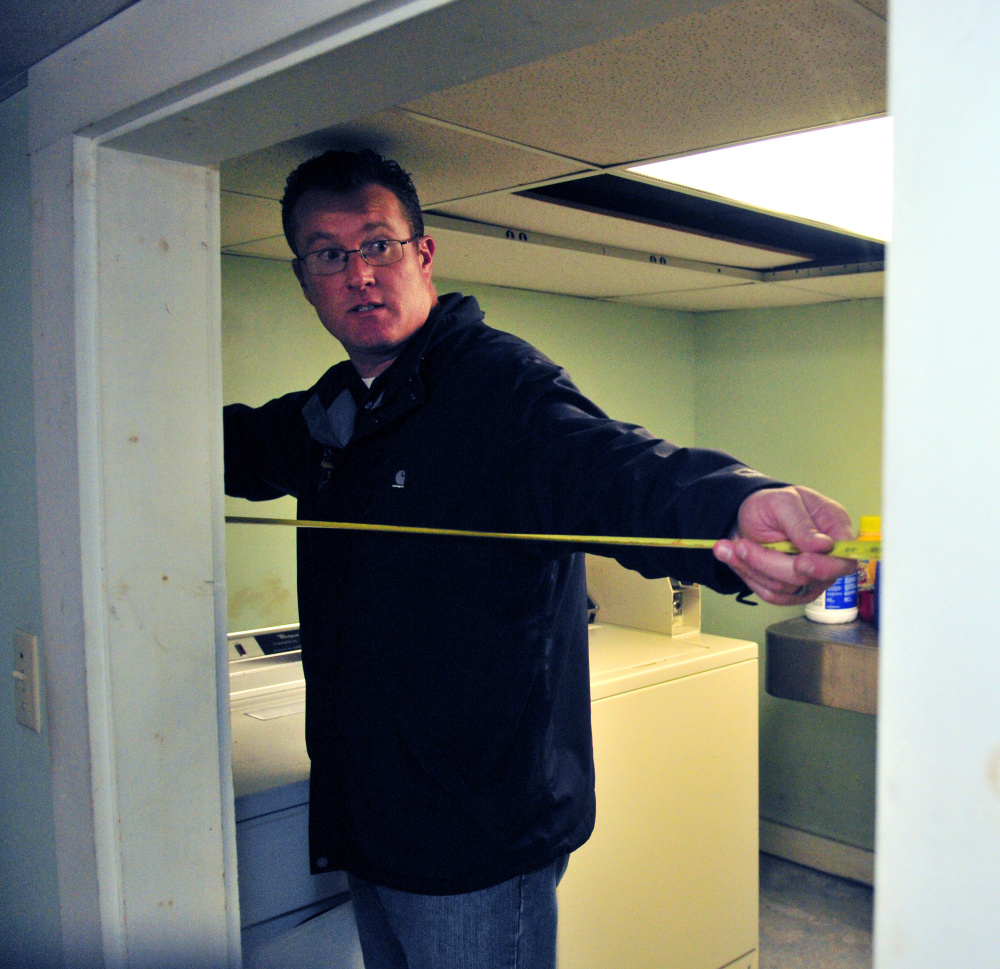
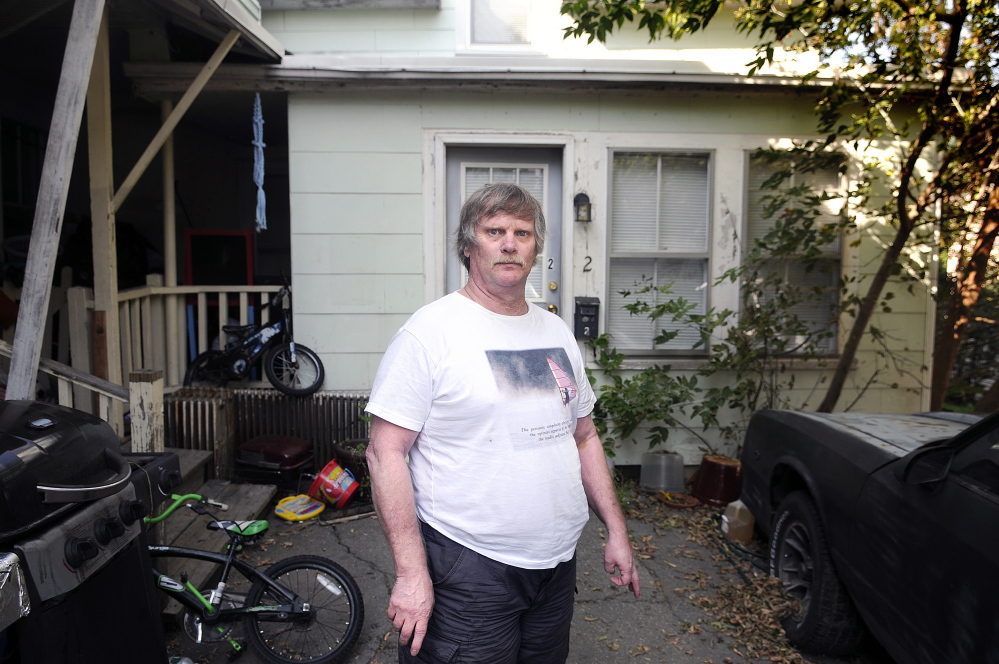
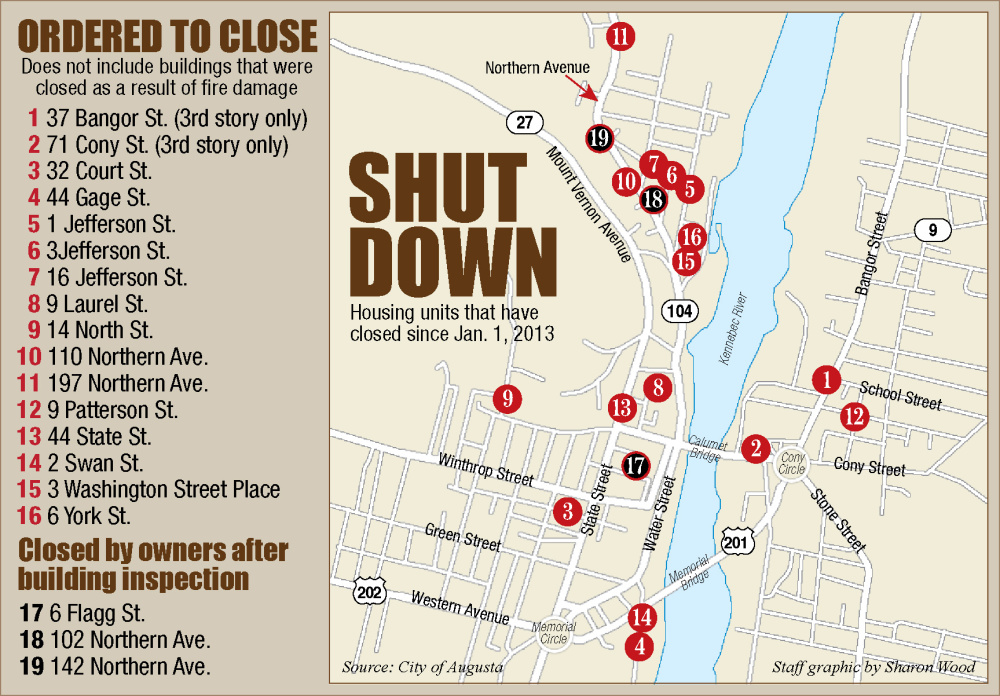

Comments are no longer available on this story